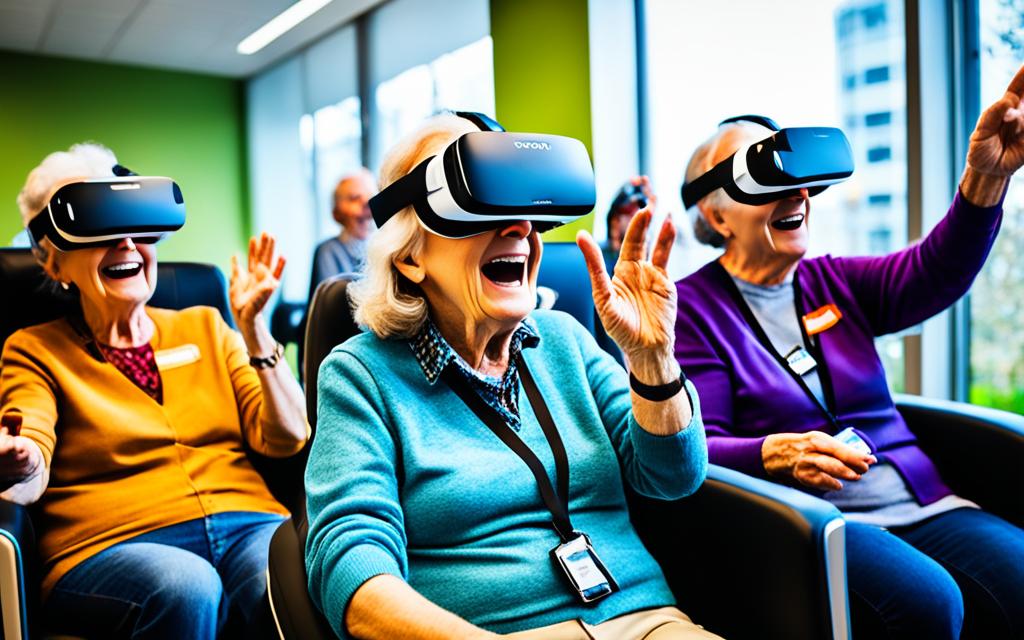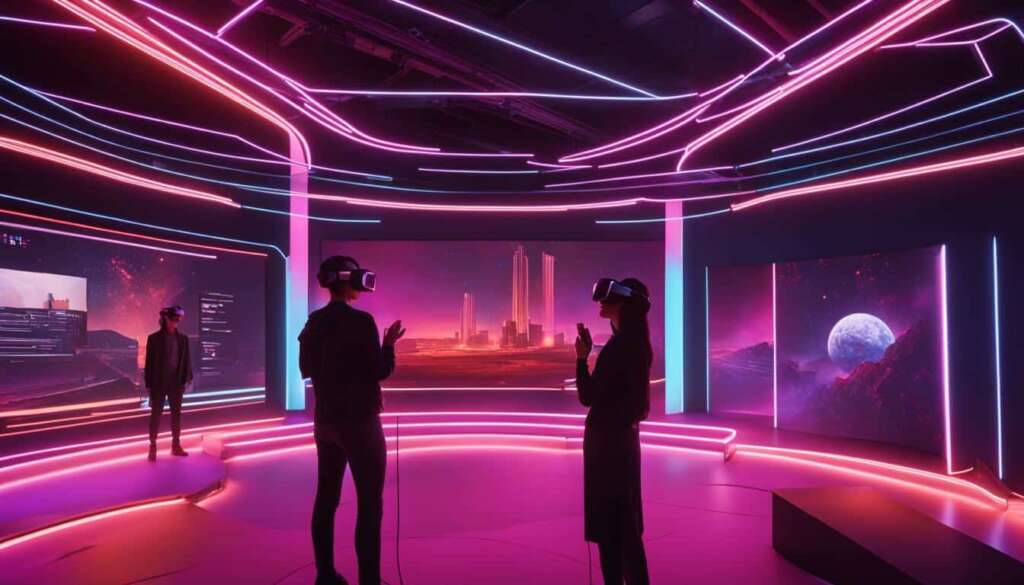Table of Contents
A recent study conducted by researchers at Stanford University and Mynd Immersive has found that a majority of retired individuals enjoy virtual reality (VR) experiences. The study included 245 participants aged 65 to 103 from 17 retirement communities across the United Kingdom. The seniors were introduced to various VR environments that offered digital experiences such as parachuting, music performances, and visiting famous places.
The study found that nearly 80% of the participants reported an improvement in their emotional state after experiencing VR, while almost 60% felt a decrease in social isolation. These findings suggest that VR can have a positive impact on the well-being of retired people.
Benefits of VR for Retired People
The study conducted by Stanford University and Mynd Immersive has uncovered several significant benefits of virtual reality (VR) for retired individuals. These benefits contribute to improving various aspects of their well-being and overall quality of life.
Enhanced Emotional Well-being
VR experiences have the potential to profoundly impact and improve the emotional state of retired individuals. By providing immersive and engaging environments, VR can positively influence mood and generate feelings of positivity, joy, and relaxation. The ability to escape into virtual worlds allows retired people to temporarily leave behind any stress or worries they may have, leading to improved overall emotional well-being.
Reduced Social Isolation
One of the significant challenges faced by retired people is social isolation. VR has emerged as a powerful tool in addressing this issue by enabling retired individuals to connect with others and participate in virtual social activities. Through VR, retirees can interact with friends, family, and even strangers in a simulated environment, fostering social connections and reducing feelings of loneliness or isolation. This virtual socialization can significantly enhance retired people’s sense of belonging and inclusion in society.
Stimulated Mind and Enhanced Cognitive Function
VR experiences offer retirees mental stimulation that can positively impact cognitive function. By engaging multiple senses (such as sight, sound, and touch), VR can provide sensory-rich environments that challenge and activate the mind. These immersive experiences could potentially improve memory, attention, and concentration, preventing cognitive decline and promoting mental agility among retired individuals.
Fostering Nostalgia and Happiness
VR can transport retired individuals back in time, allowing them to revisit cherished memories and experiences from their past. By simulating familiar settings, such as childhood homes, beloved travel destinations, or historical events, VR can evoke a sense of nostalgia. This experience not only brings joy and happiness but also stimulates conversations and reminiscences, fostering connections between retirees and their loved ones.
Overall, the findings of the study indicate that VR has the potential to enhance the leisure and social experiences of retired individuals. By improving emotional well-being, reducing social isolation, stimulating the mind, and fostering nostalgia, VR opens new avenues for retired people to enjoy a fulfilling and engaging retirement lifestyle.
| Benefits of VR for Retired People | Description |
|---|---|
| Enhanced Emotional Well-being | VR provides immersive experiences that positively affect mood and offer an escape from stress. |
| Reduced Social Isolation | VR enables retired individuals to connect with others and participate in virtual social activities, reducing feelings of loneliness and isolation. |
| Stimulated Mind and Enhanced Cognitive Function | VR experiences engage multiple senses, stimulating the mind and promoting cognitive function among retired individuals. |
| Fostering Nostalgia and Happiness | VR allows retirees to revisit memories and experiences from their past, evoking a sense of nostalgia and fostering happiness and connections. |
Implications for Healthcare and Aging
The findings of this study have important implications for healthcare and aging. Virtual reality (VR) can be used as a therapeutic tool for managing emotional health and reducing loneliness in retired individuals. By immersing themselves in VR experiences, seniors can escape the limitations of their physical world and engage in activities that bring them joy and satisfaction.
For seniors with dementia, VR has the potential to improve cognitive function and trigger memories. The immersive nature of VR experiences can stimulate the senses and evoke nostalgic feelings, helping seniors reconnect with their past and fostering a sense of identity and well-being.
“VR provides a safe and controlled environment for seniors to explore and interact with their surroundings, creating opportunities for cognitive stimulation,” explains Dr. Rebecca Phillips, a geriatric specialist at St. Mary’s Hospital.
“It’s remarkable to witness the transformative effects of VR on seniors with dementia. We’ve seen improvements in memory recall and emotional well-being that were previously unimaginable.”
Dr. Rebecca Phillips
Furthermore, the use of VR in retirement communities can provide a novel and engaging form of entertainment and socialization for residents. Seniors can virtually travel to different locations, attend live performances, and interact with others in a simulated environment. This can help combat social isolation and promote a sense of belonging among retired individuals.
In addition, rehabilitation programs can incorporate VR technology to improve mobility and physical activity among seniors. By creating virtual environments that encourage movement and exercise, VR can help seniors maintain their independence and overall health.
| Benefits of VR for Healthcare and Aging | |
|---|---|
| Therapeutic tool for managing emotional health | Reduces loneliness |
| Improves cognitive function and triggers memories | Enhances social engagement in retirement communities |
| Provides novel and engaging entertainment | Improves mobility and physical activity in rehabilitation programs |
Conclusion
In conclusion, the study conducted by Stanford University and Mynd Immersive demonstrates that the majority of retired individuals enjoy VR experiences. The study found that VR has the potential to improve emotional well-being, reduce social isolation, stimulate the mind, and enhance cognitive function among retired people. These findings have significant implications for healthcare and aging, as VR can be used as a therapeutic tool and form of entertainment for retired individuals. With the growing popularity of VR technology, it is important to further explore its benefits and applications in improving the well-being of retired people.
FAQ
How many participants were included in the study?
The study included 245 participants aged 65 to 103 from 17 retirement communities across the United States.
What VR environments were the seniors introduced to?
The seniors were introduced to various VR environments that offered digital experiences such as parachuting, music performances, and visiting famous places.
What were the findings of the study?
The study found that nearly 80% of the participants reported an improvement in their emotional state after experiencing VR, while almost 60% felt a decrease in social isolation.
What are the benefits of VR for retired individuals?
VR has the potential to improve emotional well-being, reduce social isolation, stimulate the mind, enhance cognitive function, and provide a sense of nostalgia and happiness.
How can VR be used in healthcare and aging?
VR can be used as a therapeutic tool for managing emotional health, reducing loneliness, improving cognitive function in seniors with dementia, providing entertainment and socialization in retirement communities, and enhancing rehabilitation programs for seniors.
What are the implications of the study for healthcare and aging?
The study suggests that VR can enhance the quality of life for retired individuals, contribute to their overall well-being, and improve healthcare and aging outcomes through its therapeutic and entertainment applications.













